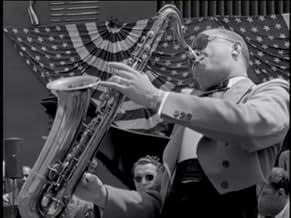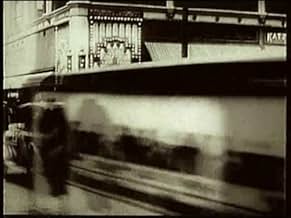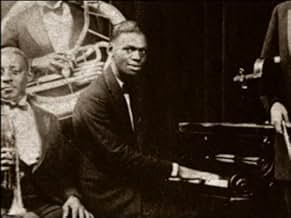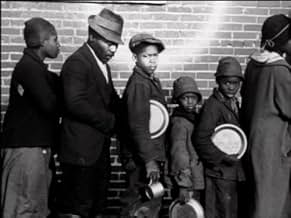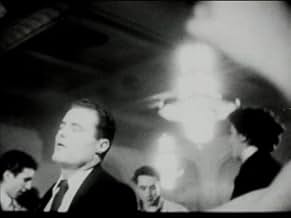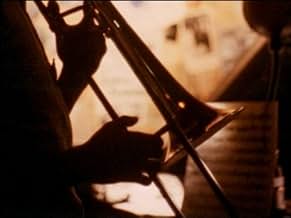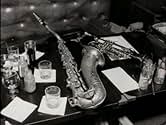Jazz: A Film by Ken Burns
- Minissérie de televisão
- 2001
- 1 h 48 min
AVALIAÇÃO DA IMDb
8,6/10
2,6 mil
SUA AVALIAÇÃO
Adicionar um enredo no seu idiomaA survey of the musical form's history and major talents.A survey of the musical form's history and major talents.A survey of the musical form's history and major talents.
- Indicado para 5 Primetime Emmys
- 2 vitórias e 7 indicações no total
Explorar episódios
Avaliações em destaque
Don't bother with the U.K. version (12 hours) buy the USA version (19.5 hours) it contains more and can usually be found at lower cost.
Covers the birth of jazz, swing era, move to bebop, free modal very well, but there is only scant coverage of more modern moves in the field of jazz.
Mr Burns has argued that he is more of an historian than a critic and as such he can only really deal with the phases of jazz that are from the past. This line of reasoning is, I think, not un-reasonable.
A nice touch on the DVDs is that when a piece of music is playing then pressing the "info" button on the DVD or its handset, brings up a screen about the music being played, e.g. title of music, who wrote it, who is playing, when was it recorded, etc.
Covers the birth of jazz, swing era, move to bebop, free modal very well, but there is only scant coverage of more modern moves in the field of jazz.
Mr Burns has argued that he is more of an historian than a critic and as such he can only really deal with the phases of jazz that are from the past. This line of reasoning is, I think, not un-reasonable.
A nice touch on the DVDs is that when a piece of music is playing then pressing the "info" button on the DVD or its handset, brings up a screen about the music being played, e.g. title of music, who wrote it, who is playing, when was it recorded, etc.
Ken Burns' Jazz documentary, which is a twenty-hour documentary (too long or not long enough would be the argument, I'd go with not long enough), details the history of Jazz from its origins in Ragtime, up until the 1960's. It is indeed insightful for those who do not know the histories of these people, pretty much all of them terrific or outstanding, and it does try to take you inside their world. As one who has only really gotten into Jazz within the past few years, as just a history lesson it keeps attention most of the way through.
The problems one can find in the documentary could be really squared down to two. The first is that Burns, while talented and obviously with a good research team and plethora of pictorial aids, forgets something about Jazz- it's supposed to be fun! There's something about the sense of humor and vitality of jazz that gets lost among the heavy-handed narrations, that make jazz out to be as mighty and colossal as the Greeks or the Romans. Jazz is important to the world of music, but much of what is spoken trumps most of the experiences in the stories (not that a few of them aren't entertaining- most of the stuff involving Armstrong, Bix, Blaisie, and Art Tatum keeps interest that way). The second problem, which is a given considering the length of the documentary, is that there isn't enough room for everyone, and after Miles and Coltrane, it just halts. It would be intriguing if Burns went back and did a 'special edition' treatment, and cover more ground on what he had, and expand into the great jazz that did come out since the 60's (and there has been a few, believe you/me).
If you're wanting to get into the atmosphere, the moods and histories (and of course the music, some of it rare here) on Jazz, basically this is the best place to start. But if you're already an aficionado, or if you don't have the utmost attention span to watch all of the footage, it may comes to let-down.
The problems one can find in the documentary could be really squared down to two. The first is that Burns, while talented and obviously with a good research team and plethora of pictorial aids, forgets something about Jazz- it's supposed to be fun! There's something about the sense of humor and vitality of jazz that gets lost among the heavy-handed narrations, that make jazz out to be as mighty and colossal as the Greeks or the Romans. Jazz is important to the world of music, but much of what is spoken trumps most of the experiences in the stories (not that a few of them aren't entertaining- most of the stuff involving Armstrong, Bix, Blaisie, and Art Tatum keeps interest that way). The second problem, which is a given considering the length of the documentary, is that there isn't enough room for everyone, and after Miles and Coltrane, it just halts. It would be intriguing if Burns went back and did a 'special edition' treatment, and cover more ground on what he had, and expand into the great jazz that did come out since the 60's (and there has been a few, believe you/me).
If you're wanting to get into the atmosphere, the moods and histories (and of course the music, some of it rare here) on Jazz, basically this is the best place to start. But if you're already an aficionado, or if you don't have the utmost attention span to watch all of the footage, it may comes to let-down.
I enjoyed watching "Jazz" but as the show progressed I enjoyed it less and less. Much of it is because I simply like the older jazz and swing music and didn't enjoy the more modern free-form style of jazz. Much of it is also because the more I watched the show the more I noticed a few biases. EVERY EPISODE MENTIONED LOUIS ARMSTRONG. While he was a jazz great, it was obvious that Ken Burns REALLY adores Louis Armstrong and I wish he'd just made a show about him! He also strongly loves Duke Ellington. But he also inexplicably skips over some jazz or swing musicians who deserved mentioned--in particular Cab Calloway. He only mentions him BRIEFLY twice--and never positively or in any depth at all. The same could be said for Glenn Miller when the shows were about swing--it wasn't very complementary and was VERY brief (never even mentioning his premature death). This makes me wonder about what I watched--was it really the comprehensive history of jazz or just a particular and biased view? Still, despite this, the shows are well made, have some great music and did get me to appreciate and enjoy jazz and especially swing much more than I had. Worth seeing but I really would like to see some alternate view of the history of jazz, as it just felt like I was missing something.
10PCARONA
I've never been one to send in any type of critique or review to any type of website, but after viewing the Ken Burns "jazz" documentary, I knew this was a call to arms. I've never been so moved before by any film/doc etc.. through the brilliant use of historical footage and expert insight that dances along with the music of the day it's a perfect marriage of sound and vision. I was actually brought to tears of joy several times throughout the series. if anyone is even remotely interested in any type of American history/music of any kind or just a lover of great programming ,this is a must for all. A true American classic! not only did this series reconnect me with such intricate American heritage, but introduced me to a whole new world of exquisite, fascinating music that I immediately fell in love with. For this I am forever grateful to Mr. Burns. the only thing I'm not happy about is the fact that now I've been on a constant quest and spending spree of most of my weekly paycheck on a jazz cd purchasing frenzy!!! Ohh well , it's worth every penny ,keep up the superb work and now its time to venture into the civil war series.
It's very sad to read how many people were bowled over by this so-called documentary. Sadder yet to see how many were coerced into thinking that this was a legitimate history of jazz. Let us look at some facts:
Before beginning this project, Ken Burns had in his own words, "maybe two" jazz cds. Because of this, he looked toward Wynton Marsalis for guidance. As a result, the entire documentary was slanted in accordance with Wynton's beliefs--the strongest belief being that white people have nothing to contribute to the genre.
This in mind, it is obvious that taking all of one's cues from him is a rather large mistake, as evidenced in Ken's show. For example, the entire West Coast movement was written off. There is no mention of Stan Kenton, Woody Herman, and many of the other great artists and innovators, simply because they were the wrong color...white. In addition, the trombone is not considered to be relevant past the big band era (Sorry J.J. Johnson!! Sorry Kai Winding!). Then of course, there is the statement made that no worthwhile jazz was composed after (approximately) 1965...well...until WYNTON MARSALIS came along!! What a slap in the face!! This is just the tip of the iceberg.
Yes, there were some good things in the show. The old footage of the great ones: Armstrong, Ellington, Basie, etc. It's too bad that Burns neglected to interview many of the musicians who are still alive that played in these organizations. Clark Terry, one of the finest trumpet players to ever walk the earth, and who played in BOTH Ellington and Basie's bands, ended up having less than 2 minutes, speaking about things that were relatively trite.
The main message that permeated this series was this: Black people created jazz, and whites made only minor contributions. Wynton has stated before that there is nothing that a white person could teach him about jazz. This means in Wytnon's mind that Django, Kenton, Bill Evans, Bix, Brubeck, Chet Baker, Gerry Mulligan, Jack Teagarden, Kai Winding, etc., etc., etc...have nothing to contribute, because they're white. Sad, isn't it?
Hopefully, someday Wynton and Burns will see that two wrongs don't make a right. Until then, if you want a true history of jazz, pick up a book called "Meet me at Jim and Andy's" by Gene Lees.
Before beginning this project, Ken Burns had in his own words, "maybe two" jazz cds. Because of this, he looked toward Wynton Marsalis for guidance. As a result, the entire documentary was slanted in accordance with Wynton's beliefs--the strongest belief being that white people have nothing to contribute to the genre.
This in mind, it is obvious that taking all of one's cues from him is a rather large mistake, as evidenced in Ken's show. For example, the entire West Coast movement was written off. There is no mention of Stan Kenton, Woody Herman, and many of the other great artists and innovators, simply because they were the wrong color...white. In addition, the trombone is not considered to be relevant past the big band era (Sorry J.J. Johnson!! Sorry Kai Winding!). Then of course, there is the statement made that no worthwhile jazz was composed after (approximately) 1965...well...until WYNTON MARSALIS came along!! What a slap in the face!! This is just the tip of the iceberg.
Yes, there were some good things in the show. The old footage of the great ones: Armstrong, Ellington, Basie, etc. It's too bad that Burns neglected to interview many of the musicians who are still alive that played in these organizations. Clark Terry, one of the finest trumpet players to ever walk the earth, and who played in BOTH Ellington and Basie's bands, ended up having less than 2 minutes, speaking about things that were relatively trite.
The main message that permeated this series was this: Black people created jazz, and whites made only minor contributions. Wynton has stated before that there is nothing that a white person could teach him about jazz. This means in Wytnon's mind that Django, Kenton, Bill Evans, Bix, Brubeck, Chet Baker, Gerry Mulligan, Jack Teagarden, Kai Winding, etc., etc., etc...have nothing to contribute, because they're white. Sad, isn't it?
Hopefully, someday Wynton and Burns will see that two wrongs don't make a right. Until then, if you want a true history of jazz, pick up a book called "Meet me at Jim and Andy's" by Gene Lees.
Você sabia?
- ConexõesFeatured in WatchMojo: Top 10 Documentary Mini Series (2015)
Principais escolhas
Faça login para avaliar e ver a lista de recomendações personalizadas
- How many seasons does Jazz have?Fornecido pela Alexa
Detalhes
- Data de lançamento
- Países de origem
- Central de atendimento oficial
- Idioma
- Também conhecido como
- Jazz
- Empresas de produção
- Consulte mais créditos da empresa na IMDbPro
- Tempo de duração
- 1 h 48 min(108 min)
- Cor
- Mixagem de som
- Proporção
- 1.33 : 1
Contribua para esta página
Sugerir uma alteração ou adicionar conteúdo ausente


